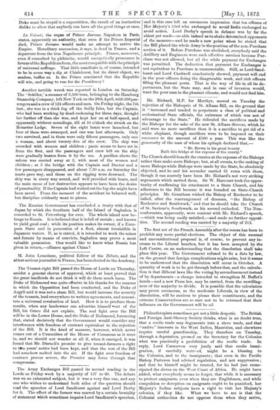The Army Exchanges Bill passed its second reading in the
Lords on Friday week by a majority of 137 to 60. The debate was on an exhausted subject, but it was a very fine one, and any one who wishes to understand both sides of the question should read the speeches of Lord Sandhurst against and Lord Derby for it. The effect of the former was marred by a certain brutality of statement which so_metimes impairs Lord Sandhurst's speeches, and in this ease left an erroneous impression that ten officers of Her Majesty's 53rd who exchanged to avoid India exchanged to avoid action. Lord Derby's speech in deform was by far the ablest yet made—so able indeed asto shake determined opponents of the measure—and he made a new point when he stated that the Bill placed the whole Army in the:position of the non-Purchase section of it. Before Purchase was abolished, everybody said the Artillery and Engineers were such effective services because Pur- chase was not allowed, but all the while payment for Exchanges was permitted. The deduction that payment for Exchanges is not equivalent to Purchase is unanswerable. Still, as Lord Sand- hurst and Lord Cardwell conclusively showed, payment will end in the poor officers doing the disagreeable work, and rich officers filling the pleasant posts. That is the way of life in all its de- partments, but the State may, and in case of invasion would, want the poor man in the pleasant climate, and wouldmot find him.


































 Previous page
Previous page